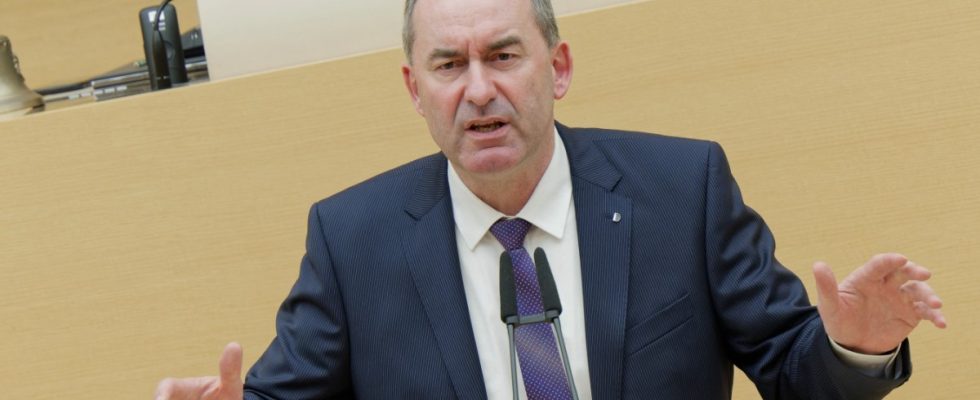In the state parliament, Hubert Aiwanger outlined a picture of a successful economic policy in Bavaria and a busy ministerial activity – and thereby rejected the recent debates that he was allowing his official duties to wither away through excessive participation in farmers’ protests. The Free State is a leader in many areas in the Federal Republic and is “doing well in every subject area,” he said on Thursday in the state parliament’s economic committee, where he gave MPs a report on his work.
Independent of the federal government, which has its back against the wall in terms of budgetary policy, Bavaria has “put its sheep out of the woods” early on with many subsidies and, overall, is defying a climate of energy prices and taxes that is hostile to the economy. According to the Economics Minister, this is demonstrated by the fact that nine billion euros are generated for state financial equalization. If you kept the money, “we could install golden guard rails on the highways.”
After the meeting, Aiwanger said in response to questions from the press about his work that he had a “very long working day” but that one “can’t be on all fronts at the same time.” But it “poisons the climate of the coalition” when people constantly blame each other, “attack the other’s minister” and always keep an eye on who is where and when. Rather, in a government alliance it is appropriate to “give yourself a certain amount of room for maneuver”.
The coalition partners CSU and Free Voters have long been arguing about the question of whether a minister’s workplace is his ministry, parliament and his desk – or the stages of protests across the country. Most recently, this was sparked by the citizens’ vote in the municipality of Mehring in the Altötting district against a wind farm that the Bavarian chemical triangle around Wacker Burghausen urgently needs. Aiwanger canceled a planned visit there in January and instead attended several farmers’ demonstrations that day. In a television appearance, he defiantly blamed Prime Minister Markus Söder (CSU) for the fact that the plans for the local wind turbine fell through – so to speak: not my construction site. He also “cannot be sent everywhere”.
Most recently, Söder’s State Chancellery and other CSU politicians such as General Secretary Martin Huber reminded the Economics Minister of his departmental responsibilities. And even before that – after the cabinet meeting a few weeks ago – State Chancellor Florian Herrmann (CSU) had announced that “demo hopping” was not “the method of choice” for MPs and ministers. After all, at such protests, the “actual work” for which one is paid does not take place. At the time, Herrmann wanted the criticism to be understood “generally”, but immediately afterwards reported that the cabinet had given Aiwanger an order to take care of the imbalance in the Free State’s export balance.
Stephanie Schuhknecht (Greens), head of the Economic Committee, said on Thursday that there was a “great need to talk.” Aiwanger would please explain his “agenda for the next few months and years.” More than a dozen members of the committee then asked countless detailed questions. Aiwanger did not want to admit any negligence on any topic. He called for a “jolt” in the bureaucracy right down to the “ultimate offices of the authorities”. They should not insist on every report or every mapping, but rather “let five be straight”. In general, “common sense must serve as a yardstick”. When it comes to infrastructure projects and settlements, he warned of a “saturation” among the public – people often think that the country is largely doing well. But “this thinking is fatal.”
When it comes to wind power and especially the project in the Chemical Triangle, Aiwanger promised more ambitions and discussions, including better conditions for the participation of citizens and municipalities. He had already announced this the day before in a plenary session in the state parliament: “We are not getting a blank check from the citizens along the lines of: You will do it right.” Rather, one must “deal specifically with all critics and all justified criticisms”.
And what remains of Aiwanger’s committee visit? SPD parliamentary group leader Florian Brunn summed up that the minister “actually said nothing” about specific plans, especially for renewable energies. But statements by CSU committee members did not show boundless enthusiasm for Aiwanger’s work. Walter Nussel suggested that the FW-led economic and environmental departments were not pulling together to reduce bureaucracy. And Kerstin Schreyer, deputy head of the committee, called for clear “concepts” for communication with citizens on energy projects, possibly including external professionals. Aiwanger countered that, in his opinion, “bought-in strategists” lack the “tact” to speak to the people in the regions. And you can’t “communicate to people something that they themselves see differently.”
One person, however, seemed to be completely happy with the minister’s performance. Instead of asking a question, FW MP Rainer Ludwig spoke of “respect” for Aiwanger’s achievements, as he pursued his path “with competence and pragmatism”. Business and agriculture are grateful to have him.

